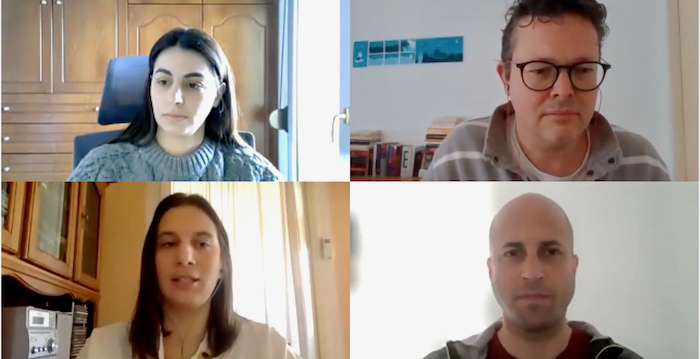Watch our fourth global dialogue with religion journalists, this time from Europe

Please enjoy our recording of this global dialogue among religion journalists about current issues involving political movements in various parts of the world. (If you care to learn more about our videos, please visit the IARJ YouTube channel and subscribe.)
This dialogue was held on February 25, 2022, and was moderated by Jelena Jorgacevic, an IARJ regional representative and a reporter for the Serbian weekly Vreme. Now, the recorded video can be streamed via our IARJ YouTube channel.
In this 48-minute conversation, Jelena quickly outlines the issues she hopes the panel will explore—and what follows is one of the most fascinating dialogues in our series. Joining Jelena are Georgia Geleoudi, a religion blogger covering Greece and Cyprus; Hendro Munsterman, Vatican and Rome Correspondent for the Dutch daily newspaper Nederlands Dagblad; and Jonah Mandel, an IARJ founding member and a correspondent in Israel for the French news agency AFP.
All three of these panelists cover regions of the world in which the majority of the population is historically and culturally identified with a religious group. As this dialogue unfolds, the journalists point out similarities as well as distinctive contrasts in the nations they cover.
Georgia says, According to the latest reports, 95 to 98 percent of the total population in Greece is part of the Greek Orthodox church … and it is very connected to our cultural identity. Also the church has very strong connections with the government.
However, in contrast, Henro points out that while 80 percent of the population in Italy is Roman Catholic,
there also has been a separation of church and state since 1948.
In fact, the church’s official teaching, especially under the pontificate of Pope Francis, makes it almost impossible for Italian political parties to fully identify with the Vatican. Official church teachings on issues concerning sexuality, abortion and marriage are widely considered as politically conservative, but Vatican teachings on refugees, migration and global poverty are widely regarded as liberal. So, on the political level, there are almost no political parties that entirely recognize themselves in everything.
That means the greatest Catholic impact in Italian culture, daily life and politics now is not so much a matter of official government policies than it is a multi-layered influence that includes the work of grass-roots movements, Henro says. He goes on to describe examples he has seen.
Jonah agrees that Israel is a bit similar to Italy and Greece in that there is a dominant religion in terms of the size of that community. About 75 percent of Israel’s citizens are Jewish. Another 20 percent are Muslim and another 5 percent are christian or undefined.
Then, like Georgia and Henro, Jonah also offers examples of friction between religious tradition and national policy—and describes ways that religious influence is evolving. That includes a growing interest among Israelis in redefining religious authority over lifecycle events, especially marriage and divorce.
These five journalists cover a remarkable range of topics in less than an hour.
Please, if you enjoy this conversation, share this video with friends via email or social media.
Here is a recording of the most recent dialogue: (After live streaming on our IARJ Facebook page, these dialogues are permanently archived in YouTube. If you prefer, you also can watch this dialogue directly from our YouTube channel.)
